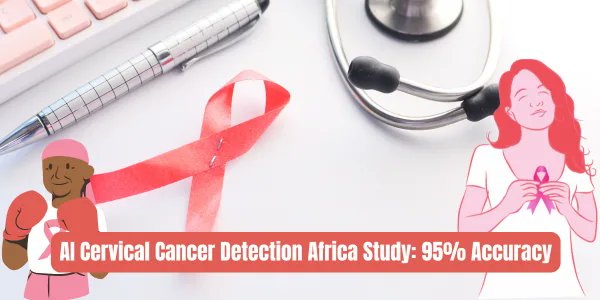A revolutionary artificial intelligence system is achieving unprecedented accuracy in detecting cervical cancer, offering new hope for millions of women across the African continent where the disease remains a leading cause of cancer deaths.
The Silent Epidemic
Every year, cervical cancer claims the lives of thousands of African women, many of whom could have been saved through early detection. The disease, though largely preventable, continues to devastate communities across the continent, particularly in rural and underserved areas where access to trained pathologists and quality healthcare infrastructure remains severely limited.
But a technological revolution is now underway that could fundamentally transform this grim reality.
The AI Breakthrough
Recent advances in artificial intelligence have demonstrated remarkable capabilities in cervical cancer screening, with systems achieving up to 95% accuracy in detecting precancerous lesions and early-stage cancer. These AI-powered diagnostic tools are not just matching human experts—in many cases, they’re surpassing them.
A comprehensive meta-analysis published in December 2024 revealed that AI systems demonstrated superior accuracy compared to experienced colposcopists in cervical examinations, analyzing data from over 280,000 tests across multiple countries. The technology has proven particularly effective in cytology screening and colposcopy, the two primary methods used for cervical cancer detection.
“The results underscore the potential and practical value of AI in preventing and enabling early diagnosis of cervical cancer,” researchers noted in the landmark study, which emphasized the technology’s particular promise for low- and middle-income countries with limited resources.
African Innovation Takes Center Stage
Across Africa, homegrown innovations are emerging to tackle the cervical cancer crisis head-on. In Uganda, the PapsAI platform has been developed to provide early cervical cancer diagnosis through AI-powered analysis of pap smear tests. The technology eliminates the labor-intensive manual analysis that has long been prone to human error and delays, significantly reducing both the cost and time required for diagnosis.
The platform’s founder has been recognized by the World Health Organization Africa as one of the region’s AI health innovators with the potential to dramatically reduce disease burden across the continent.
In Morocco, DataPathology combines artificial intelligence with digital technology to analyze 3D cell images, detecting even the smallest abnormalities that could indicate cervical cancer. Founded by pathologist Hicham El Attar after losing his mother to the disease, the company aims to provide efficient and affordable diagnostic services to medical practitioners and patients throughout Africa.
Meanwhile, recent field tests in Kenya and Tanzania have demonstrated both the promise and the practical challenges of implementing AI-assisted cervical cancer screening in resource-limited rural settings. The studies revealed that while AI can enable faster analysis and broader access to screening, success depends critically on consistent sample quality, reliable supply chains for medical reagents, and building trust within local communities.
Why Africa Needs This Technology Now
Cervical cancer is the second most common cancer among African women, yet the continent faces a severe shortage of trained pathologists and cytologists needed for traditional screening programs. In many countries, women must travel hundreds of kilometers to access basic screening services, and results can take weeks or months to process.
This is where AI technology becomes transformative. Digital microscopes and AI algorithms can analyze cervical cell samples in minutes rather than days, providing immediate results that enable same-day treatment decisions. The technology can be deployed in remote clinics, reducing the need for women to make multiple long-distance trips for screening and follow-up care.
Moreover, AI systems can help address the critical shortage of trained specialists by augmenting the capabilities of healthcare workers at all levels, enabling them to provide high-quality screening services even without years of specialized training in cytopathology.
The Path Forward: Challenges and Opportunities
Despite the promising results, significant hurdles remain before AI-powered cervical cancer screening can reach its full potential across Africa. Key challenges include ensuring data privacy and security, addressing potential algorithm bias, and establishing robust regulatory frameworks appropriate for the African context.
Infrastructure requirements—including reliable electricity, internet connectivity, and supply chains for medical reagents—remain critical bottlenecks in many rural areas. Additionally, building trust and acceptance among both healthcare providers and patients will require sustained community engagement and education efforts.
Investment in training healthcare workers to use these new technologies effectively is equally crucial. As researchers noted in recent field studies, the technology’s effectiveness depends not just on the AI algorithms themselves, but on the entire ecosystem of support systems, from sample collection to result interpretation and patient follow-up.
A Vision for 2030
The World Health Organization has set an ambitious target: screen 70% of women with high-performance tests between the ages of 35 and 45 by 2030 as part of its global strategy to eliminate cervical cancer. For many African countries, achieving this goal through traditional screening methods would be virtually impossible given current resource constraints.
AI technology offers a viable pathway to reach this target. By dramatically reducing the cost and complexity of screening while improving accuracy, these innovations could enable the kind of large-scale screening programs needed to turn the tide against cervical cancer.
Early detection saves lives—and with AI-powered screening tools becoming increasingly accessible and affordable, the technology represents more than just a medical breakthrough. It’s a lifeline for millions of African women and a critical step toward health equity on the continent.
Looking Ahead
As African countries consider adopting AI-enabled diagnostic technologies, the emphasis must remain on ensuring these tools are accessible, affordable, and adapted to local contexts. The technology alone is not a silver bullet; it must be integrated into comprehensive health systems that include prevention, screening, treatment, and follow-up care.
The convergence of African innovation, international research collaboration, and advancing AI capabilities has created a unique moment of opportunity. With sustained investment, thoughtful implementation, and commitment to overcoming the remaining barriers, AI-powered cervical cancer screening could become a defining success story in African healthcare—proving that cutting-edge technology can indeed bridge the gaps in global health equity and save lives where they’re needed most.
For the daughters, mothers, and grandmothers across Africa, this technological revolution offers something invaluable: hope for a future where cervical cancer is no longer a death sentence, but a preventable and treatable disease caught early, when it matters most.
As research continues and more African countries pilot AI-assisted screening programs, the coming years will determine whether this technological promise can be translated into widespread, sustainable improvements in women’s health outcomes across the continent.




